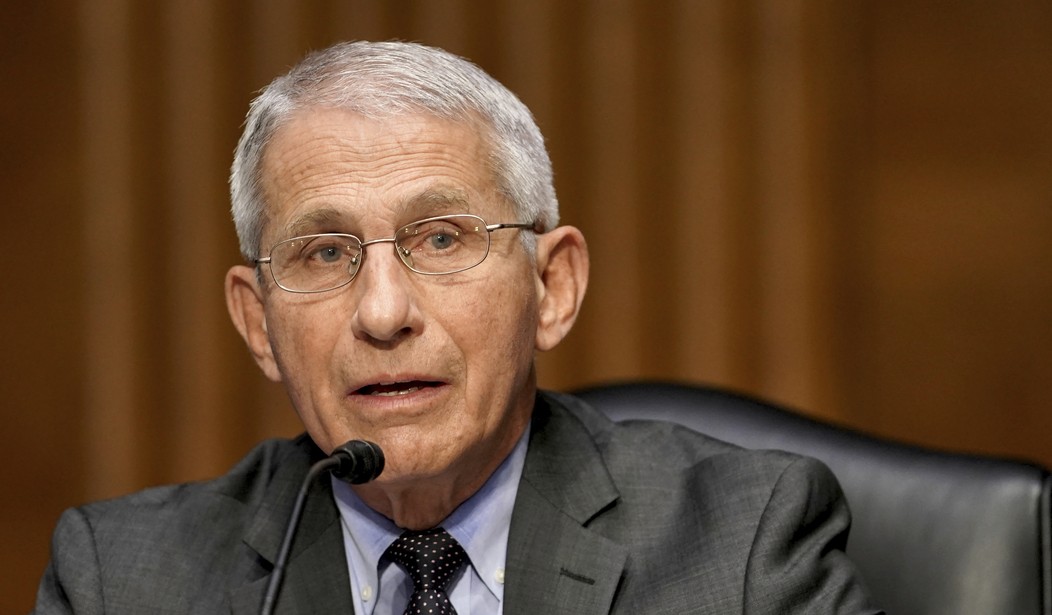It would be premature to lift them for unvaccinated people, he means. He’s not saying the vaccinated should keep taking precautions.
I think?
No one’s going to listen to him about this, but for what it’s worth, it’s a rare-ish case of him being consistent. He’s always said 10,000 cases per day nationally is his target for when all restrictions can start being lifted. We’re not there yet.
But we’re getting closer.
“We don’t want to declare victory prematurely because we still have a ways to go,” Fauci told the Guardian in an interview. “But the more and more people that can get vaccinated, as a community, the community will be safer and safer.”…
“We cannot abandon public health measures when you still have a degree of viral activity in the broad community in the United States,” Fauci said. “Although we’re down to less than 30,000 infections per day that’s still a lot of infections per day.”
The national death rate among the unvaccinated population is roughly the same as it was in late March, according to a Washington Post data analysis published this month.
He should focus less on case counts and more on vaccination rates. If you want to incentivize holdouts to get their shots, tell them that all restrictions in their county will be lifted once, say, 60 percent have had their first dose. Tying restrictions to the number of cases encourages the unvaccinated to keep free-riding on the rest of the population. After all, cases might keep dropping due to seasonal effects and a gradually growing amount of natural immunity whether or not any more holdouts choose to get immunized.
As I say, we’re not at 10K per day yet. But…

Yesterday was the first day since March 30, 2020 that the seven-day average of cases in the U.S. dipped below 20,000. It was also the first day since that terrible month that the U.S. recorded fewer than 10,000 cases:
Yesterday was the first time since March 22 of last year (when tests weren’t even easily available) that fewer than 10,000 Americans tested positive for the coronavirus in one day pic.twitter.com/RgO7Dt77XY
— Stephen Smith (@smithsj) May 31, 2021
Doesn’t that meet Fauci’s benchmark? Nah, not yet. Some county health departments doubtless took the weekend off due to the holiday instead of reporting their latest data, which means the true number of confirmed cases was higher. But as you can see from the graph above, the case average has decreased at a steady rate since mid-April, dropping by 50 percent in just three weeks’ time. If that continues, we should reach Fauci’s benchmark average by mid- to late June.
Other scientists have more exacting metrics for when it’ll be safe to ease restrictions but those may be in reach as well:
It took over 14 months to get here.
Containment is <3,000 cases/day (7-day avg) and test positivity <1%.
We can do this pic.twitter.com/CRNd9pd76t— Eric Topol (@EricTopol) May 30, 2021
Fewer than 3,000 cases per day would be a tall order, but the U.S. positivity rate currently stands at 2.3 percent, the lowest of the pandemic.
If you’re skeptical of using confirmed cases to measure the amount of illness in the country, since cases are a highly imperfect gauge, I have good news. We’re also seeing COVID-era lows in hospitalizations and deaths.


The pandemic’s ending. Nothing can stop this wonderful trend line!
Well … maybe one thing:
The UK cases were down to pandemic lows until B.1.617.2 hit. This variant has the potential to do the same here and many other countries as it becomes dominant. Log plot to show directionality. https://t.co/Y8UW00icnH pic.twitter.com/qzA239bpwD
— Eric Topol (@EricTopol) May 28, 2021
B.1.617 is the so-called Indian variant. If you missed yesterday’s post about the rise of that strain in the UK, read it now. Scientists and government officials there are sufficiently worried about it that they’re warning about the start of a third national wave and wondering if they’ll have to postpone the end of lockdown on June 21. The good news is that Pfizer’s vaccine (and presumably Moderna’s) is effective against B.1.617. The bad news is that preliminary studies suggest that the variant spreads amazingly quickly among the unvaccinated, even more so than the British variant that’s taken over here in the U.S. And while it’s obviously true that rates of cases, hospitalizations, and deaths have fallen sharply over the last few months among the *total* U.S. population, it’s not true that those rates are down uniformly among the *unvaccinated* population. WaPo demonstrated in a piece yesterday that in some communities the risk from COVID to unvaccinated people is the same now as it was in late winter or early spring. If the Indian variant gains momentum here, that risk could climb significantly. That’s what Fauci’s worried about. The only solution is to get as many holdouts as possible vaccinated, pronto.









Join the conversation as a VIP Member